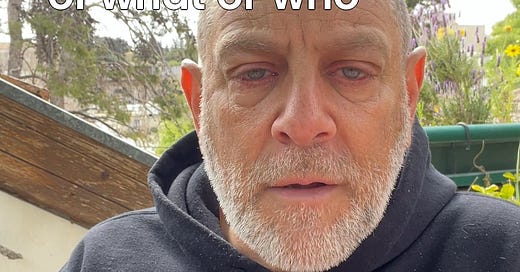Playback speed
×
Share post
Share post at current time
Share from 0:00
0:00
/
0:00
Transcript
How to Hold On: Strategies for Survival & Collective Liberation
Weekly Video Recap of Below the Bible Belt
Apr 11, 2025
What are our strategies for survival in the face of tyranny, how do we not lose hope and keep working for collective liberation even when all seems hopeless?
We inherited several strategies for coping - and for hoping. Some are ancient, biblical - and some more recent, still alive.
Today is the 11th of April, and in my family we raise a glass to celebrate my late father’s second birthday - on this day in 1945 he was liberated by the American army from Buchenwald, one of the worst Nazi death camps in Germany. My father Naphtali, Tulek, was 18, and his younger brother Yisrael, Tulek, was 7. They held on in ghettos and camps, losing their parents, tortured and starved - and survived. My father held on to life so that he can make sure his brother lives. My uncle says he kept waiting for a lick of jam that sometimes they gave him, and wanted to see his mother again. Either way - they persisted, survived, came to the land of Israel on the first boat out of Europe in July 1945 and became builders and leaders of the state of Israel, with hundreds of grandchildren and great children who honor their legacy - across all spectrums of Jewish life. And yes - that IS complicated.. But for another time..
Today, this date of liberation meets us on the eve of Passover, and in the middle of ongoing war and lack of liberation, freedom, joy and justice for too many - hostages still in Gaza, so many mourning and wounded in Israel, and millions of Gazans most of them innocent civilians trapped in a war zone, hopeless and starved. How do we enter this holiday of liberation with honest reflection on how we got here, who and how we are now, and what will help us navigate a better path - for everybody’s sake? How do we not channel our traumas and persecution onto others? What can help us hold on, as so many survivors did and do - with hope, through horrific conditions that seem endless and hopeless?
Here’s where our old book offers some guidance too.
This week on our Below the Bible Belt journey we ended the Scroll of Esther, completing all five scrolls, and began the Book of Daniel. Both Esther and Daniel are diaspora stories - written as Jews struggled to maintain their identity under cultures that demanded assimilation. Both books, like other biblical texts, offer different strategies for survival. In the story of Esther, the Jews take matters into their own hands - protesting, plotting, infiltrating the palace, seducing the king and standing up for their lives - even using violence in terrible ways to stay alive. It is about their agency. God is not mentioned once in the scroll. In the Book of Daniel - a different tactic - all about faith, obedience to the religion, and trust that God will lead the way - Daniel, like Joseph, and like Esther, is a Jewish leader who wisely advocates for his people when possible and knows how to talk truth to power.
Neither texts are accurate history and both are likely more fiction than fact but they teach us how to operate persistence, resistance, hold on to our precious legacy while not staying insular and walled up. They also remind us about hope, about patience, about ways with which we can and must stand up for justice and resist tyranny, hatred of what or who we do not know or understand, and fear-based injustice.
During this difficult time and deepening gaps between us - what I hope we share in common is our gratitude for the legacy of love and life that we inherited from our ancestors, worthy of passing on to the next generations, with less fear and more love, with resilience and courage, with faith in the best part of our humanity and commitment to decrease cruelty and increase kindness, for and with every one.
When we sit around the Seder tables, maybe take a moment to honor an ancestor who taught you how to handle struggles and stress, with whatever gifts of persistence and pride?
I’ll raise a glass to my father and all survivors, to Esther and Daniel, and to better futures for all people in the holy land, and all lands, worthy of collective liberation, liberty and love. We are not really free until all of us are free. And that’s the purpose of our lives.
Thank you for joining me below the bible belt - welcome to the Book of Daniel.
Wishing us all a sabbath of peace and a meaningful passover, delicious and hopeful, with our eye on joy and justice - for all. May peace persist and prevail. Shabbat Shalom and Pesach S’ameach.
Recent Posts












Share this post